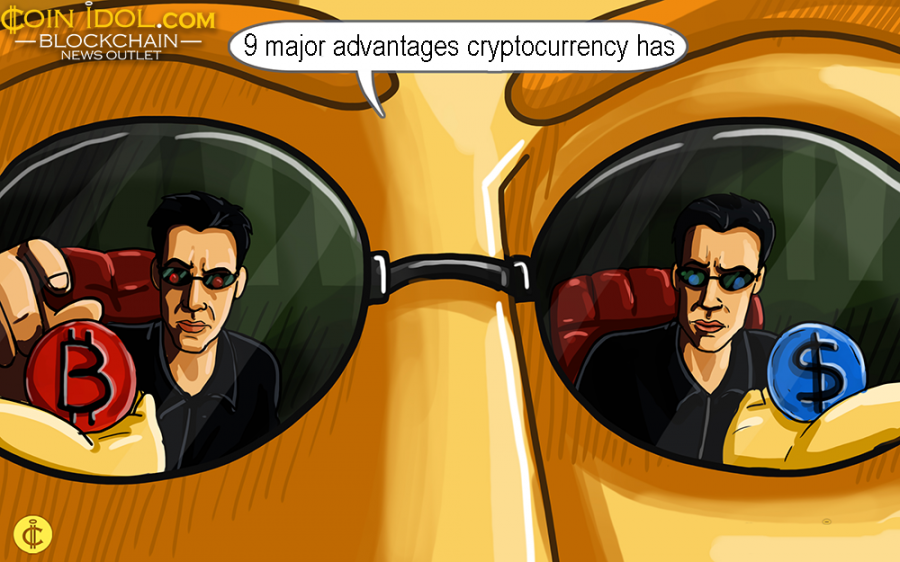9 Major Advantages Cryptocurrency has Over Credit Cards
Updated: Jul 19, 2020 at 22:00

The latest credit card fee increases have generated debate over the comparative advantages of using cryptocurrencies such as Bitcoin, Ripple, Ethereum and others.
Some big firms like Overstock, see savings from processing digital currency payments, but this doesn’t sway and convince every user in the cryptocurrency industry, at this particular stage, cards still aren’t an enhanced and healthier alternative for users.
Here are some of the reasons as to why credit cards are a mediocre payments technology currently, just a decade when the technology for digital currency payments turn out to be very sophisticated.
Cryptos Don’t Charge High Processing Fees
Several merchants use minimum purchase amounts to sidestep the high cost of processing fees, hence giving the advantage to cash for small purchases. Being in a position to pay a fraction of a cent for virtually any kind of payment, gives a big advantage to cryptos, to the extent that changing to traditional currency still leaves a more auspicious rate for the recipient than using credit cards.
Cards are Inherently Vulnerable to Theft and Compromise
Credit cards are an integrally insecure method of paying. While using cryptos, recipients only have to show their merchant addresses (public key) and the client has to initiate a payment using a private key. The recipient has no full access to the client’s funds until the payment is completed. But with credit cards, the client grants access to their total balance to the recipient and just hopes that access is not abused. Number theft, scam, card skimmers and others can lead the unsuspecting client to see a major compromise of their funds. To successfully steal cryptos, a thief has to compromise the security of the user, a ting that is more difficult.
Crypto Can’t be Blocked or Easily Confiscated
With cryptocurrencies, payments will never be blocked and balances will never be seized and confiscated. Payments can also be wired without any restrictions, and balances are never remotely seized, demanding evident and direct theft to retrieve - which is not the case with cards.
Cryptocurrency has no Waiting Period or Signup Process
Setting up a new account or getting a new credit card to make purchases is a big process with a lot of paperwork and very time-consuming. But with crypto, becoming a new user just requires to download an App.
Cards have Identity Requirements and Associated Friction
Credit cards are regularly tied to a user’s real-world identity and any related documentation. Identity barricades can bring real problems during financial transactions. A lot of factors can greatly contribute to a lack of enough documentation, ranging from immigration status to misplacement of documents, age, and others. On the other side, cash and cryptocurrency can be used by any individual, at any time, corner, without any created barricades.
Crypto Needs your Permission to Take your Money
All payments and transfers with cryptos are conducted with the full permission of the holder. The recipient on one end has to show the receiving address and the holder must also actively initiate the payment. But while using credit cards, recipients will regularly keep the card number on file and can then later initiate a charge at will, hence removing (withdrawing) user’s money from his account without his permission or consent.
Crypto Doesn’t Log your Every Purchase to Share with Advertisers
Credit card firms gather client purchase information and share it with relevant advertisers like Google hence abusing the privacy of the client. Cryptocurrency, however, lacks a direct connection to the client’s identity, and some coins like Dash have taken a step forward to advance privacy features to obscure payment origins in order to server the link between payments and the identity. Therefore, consumer privacy is higher when using cryptocurrencies than credit cards while making any purchase.
Cards can Arbitrarily Change Fees or Terms
Due to decentralization, no player can arbitrarily or randomly alter the conditions of use, as well as terms and fees. Banks and (or) card firms lacks this, they can increase or add dues on a whim, hence leaving less option for customers and recipients.
Cards can’t Efficiently Do Peer-to-Peer
Cards are created as merchant-facing technology, and while different payment and banking Apps exist, there is still a big problem of cross-compatibility. But while using cryptocurrency, the same App one uses to pay a friend is the same App he will use to purchase a pizza or a cup of coffee.
News
Price
News
Price
Coin expert

(0 comments)